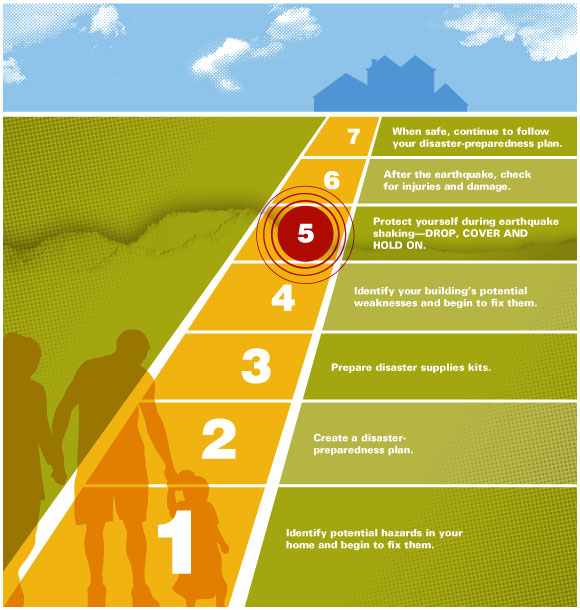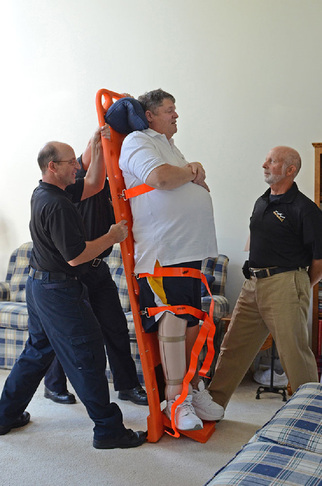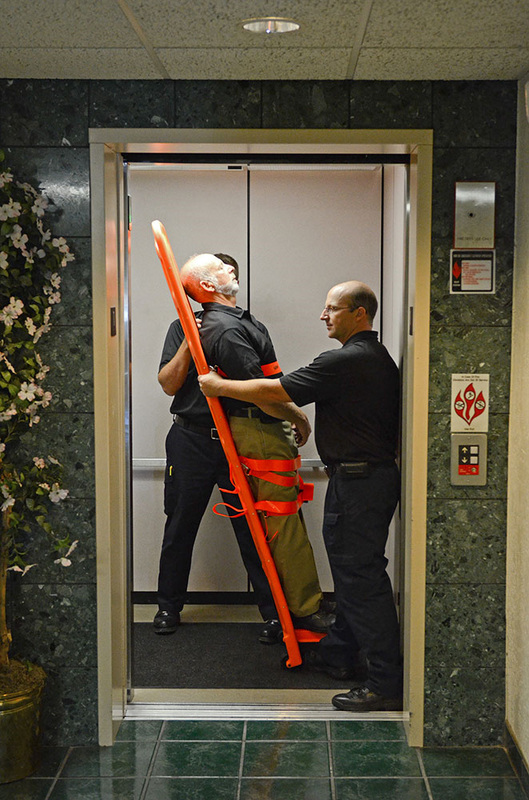Unlike hurricanes and some other natural hazards, earthquakes strike suddenly and without warning. Nevertheless, if you live in an area at risk for earthquakes, there are things that you can do to reduce the chances that you or other members of your household will be injured, that your property will be damaged, or that your home life will be unduly disrupted by an earthquake. These things all fit under the term preparedness, because to be effective, they must be done before earthquakes occur.Preparing for earthquakes involves (1) learning what people should do before, during, and after earthquakes; and (2) doing or preparing to do those things now, before the next quake.
Before the Next EarthquakeFollowing are activities that you can undertake now:
Prepare Your HomeMake your home safer to be in during earthquakes and more resistant to earthquake damage by assessing its structure and contents. Depending on when and how it was designed and built, the structure you live in may have weaknesses that make it more vulnerable to earthquakes. Common examples include structures not anchored to their foundations or having weak crawl space walls, unbraced pier-and-post foundations, or unreinforced masonry walls or foundations.
If you own your home, find and correct any such weaknesses, yourself or with professional help. If you are a renter, ask what has been done to strengthen the property against earthquakes, and consider this information in deciding where to rent. If you are building or buying a home, make sure that it complies with the seismic provisions of your local building code.
What is in your home can be as or more dangerous and damage-prone than the structure itself. Any unsecured objects that can move, break, or fall as an earthquake shakes your home are potential safety hazards and potential property losses. Walk through each room of your home and make note of these items, paying particular attention to tall, heavy, or expensive objects such as bookcases, home electronics, appliances (including water heaters), and items hanging from walls or ceilings. Secure these items with flexible fasteners, such as nylon straps, or with closed hooks, or by relocating them away from beds and seating, to lower shelves, or to cabinets with latched doors. Ensure that plumbers have installed flexible connectors on all gas appliances.
Prepare Yourself and Your Family to
- React Safely
Learn what to do during an earthquake. Hold periodic family drills to practice what you have learned. Through practice, you can condition yourselves to react spontaneously and safely when the first jolt or shaking is felt.
- Take Cover
In each room of your home, identify the safest places to “drop, cover, and hold on” during an earthquake. Practice going to these safe spots during family drills to ensure that everyone learns where they are.
- Survive on Your Own
Assemble and maintain a household emergency supply kit, and be sure that all family members know where it is stored. The kit should consist of one or two portable containers (e.g., plastic tubs, backpacks, duffel bags) holding the supplies that your family would need to survive without outside assistance for at least 3 days following an earthquake or other disaster. Make additional, smaller kits to keep in your car(s) and at your place(s) of work.
- Stay in Contact
List addresses, telephone numbers, and evacuation sites for all places frequented by family members (e.g., home, workplaces, schools). Include the phone number of an out-of-state contact. Ensure that family members carry a copy of this list, and include copies in your emergency supply kits.
- Care for People, Pets, and Property
Get training in first aid and cardiopulmonary resuscitation (CPR) through your local chapter of the American Red Cross. Find out where you could shelter your pet should it become necessary to evacuate your home. Ensure that family members know how and when to call 9-1-1, how to use your home fire extinguisher, and how, where, and when to shut off your home’s utilities (water, natural gas, and electricity). Ask your state insurance commissioner about the availability of earthquake insurance in your state.
After the Next EarthquakeOnce the shaking stops, check for injuries among your family and neighbors and, as needed, administer first aid and call for emergency medical assistance. Also check for hazards in and around your home created by earthquake damage. Keep in mind that aftershocks may strike at any time, exacerbating these hazards and requiring you to immediately drop, cover, and hold on.
Responding promptly to hazards can prevent further damage and injuries. This may entail extinguishing small fires or reporting larger blazes; shutting off the water supply when broken pipes are leaking; shutting off the electricity when damaged wiring threatens to spark fires; shutting off the natural gas when you suspect that gas is leaking; or evacuating your home when any of these hazards or others, such as structural damage, make continued occupancy potentially unsafe.
If it is necessary to leave your home, you may, in the days and weeks following the quake, need to seek emergency assistance from the American Red Cross. In the event of a presidential disaster declaration, assistance for housing and other needs may also become available from FEMA.
Regardless of the severity of this earthquake, learn from the experience. If there are things that you could have done better in preparing for this quake, do them better now in preparation for the next earthquake. If your home must be repaired or rebuilt, for example, use this opportunity to correct any structural weaknesses and ensure compliance with seismic building standards. If unsecured belongings were damaged, improve how you secure your home’s contents. If your emergency supply kit proved inadequate, use what you learned to make a kit that will better meet your needs.



 RSS Feed
RSS Feed
